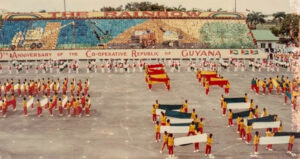Caribbean Camera’s Yolanda Marshall reflects on her own childhood mas

I served my beautiful country at a very young age. No, I was not a child soldier. I was a young performer in Mass Games, a Korean-influenced event implemented by President Forbes Burnham in 1980 to commemorate the founding of the Co-operative Republic of Guyana. This event’s performances were mandatory and kept students out of the classroom for weeks due to practising. Guyanese children and Army members would perform Caribbean cultural dances and gymnastics in a large stadium.
The President and political officials came out to witness the vibrant processions. I was a member of the youngest group; my reward was that I had fun in the sun. As a child, it was hard to fathom this game’s importance, but I can remember it as if it was only yesterday.
My costume was the trademark of my country. The colours of my short can-can skirt, made of tulle material, represented the Nation’s past, present and future. The green imitated the colour of agriculture, the leaves of the fruit trees I often climbed and the tone of our rich rainforest. The white represented the many rivers and water potential of Guyana. The golden arrow or yellow was the colour of my shiny one-piece bathing suit. (I know it is not a bathing suit, but as a child, that is all I can think of doing in it – swimming in the back dam under the bright yellow sun). Yellow is our wealth, our gold and shining glory. (This colour reminded me of my uncle’s bright yellow gold teeth, which sparkled when he smiled). Black portrays the history and endurance of our people. (I used to believe that black represented the many blackouts we endured). Red showed our zeal for life, bloodlines, and dynamic nature to build a better future for our future generation.
My brown skin shone with car grease and coconut oil to ensure I did not get ashy while I danced and practised all day in my little black ‘yattin’ boots. One thing I hated but somehow had to withstand was the lathering and rinsing on my chest with fresh baby powder – I guess some Guyanese parents wanted to prove their children smelled fresh.
Under beautiful blue skies where the Robin birds flew, the scent of freshly cooked food from the vendors invigorated the cool breeze. The stadium attracted hundreds of spectators. Those without seats sat on the rigid brick tarmac or on in the fresh green grass. The performers on stilts looked like tall, ancestral Africans amongst the masquerade, and the East Indian dancers shimmered under the sun. The army soldiers plonked on their big boots with guns on their backs. Most were muscular – a few looked a little ‘pagalee‘ (feeble). They marched as if they were silently chanting a song of the Mighty Gabby: “left, right, left, right, the government boots, the government boots!”
The gymnastics were mystifying; the dancers flexed, whined and flipped all over to drums and folk songs. The rhythm of their movements, chants, and colours signified the essence of many cultures. We danced one school at a time. Our waistlines moved with the beat, and the costumes blended into a picturesque portrait. Many students on one side of the stadium used photos, putting together a giant jigsaw puzzle of the flag, etc. It was well coordinated and lacked any mistakes. Screams of joy and laughter echoed in the air.
There I was, a child in front of the President. I was placed at the front of the group due to my independent and disciplined attitude. The teachers knew I would not run and cry, and I was always up for an adventure. The President at that time, Desmond Hoyte, made eye contact with me, pointed and smiled, and I smiled back. The Mass Games began and I, beautifully dressed in the colours of Guyana’s flag, ‘wuk up meh self‘ to some old folk songs – “small days is still on meh mind”.


